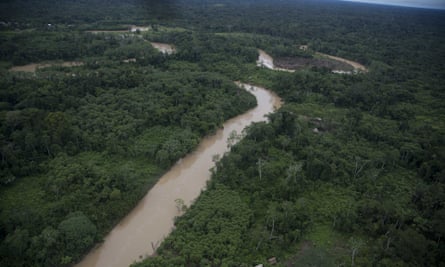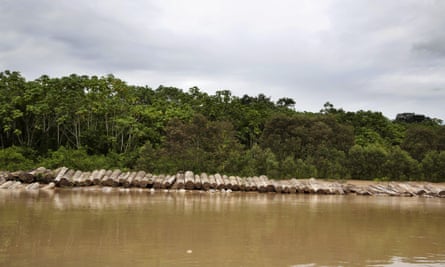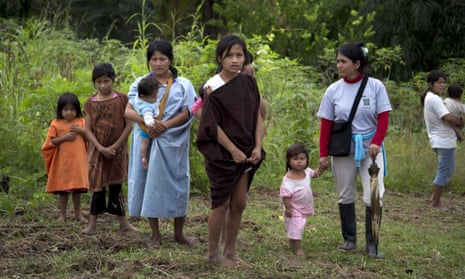“I had hoped to see his body, but I haven’t been able to yet. I haven’t even been able to see his bones. Everything was destroyed by animals.”
That’s Diana Rios Rengifo speaking about her father, Jorge Rios Perez, an Ashéninka man from the Peruvian Amazon who was assassinated last September after years opposing loggers in what the Ashéninkas consider to be their territories.
Rios Perez was killed, along with three other men from his village, Alto Tamaya-Saweto, following several threats. Loggers – possibly connected to drug-trafficking – are believed to be responsible and two men, Adencio Mapes and his son, are in prison while investigations take place.
According to the village’s lawyer, Margoth Quispe, two bodies have been identified and buried, and a third is in a morgue undergoing DNA tests.
“They’ve found Edwin [Chota Valera] and Leoncio [Quinticima Melendez],” says Rios Rengifo. “That leaves my father and Francisco [Pinedo].”
“It’s not clear who [the third body] is, but it’s presumed to be Jorge Rios,” says Quispe. “If it isn’t, it has to be Francisco.”
Since the assassinations, Rios Rengifo – like her mother, Ergilia Rengifo López, and the three other widows – have been too afraid to live in Saweto and have based themselves days downriver in the nearest big town, Pucallpa.
“The same thing that happened to my father could happen to us,” Rios Rengifo said. “We want to go back if it’s safe, but not if there’s no security. We’re scared to live there.”
“Family members of the two men detained continue threatening us and keep logging,” says Rengifo López.
Quinticima’s widow, Lita Rojas, is living in Pucallpa with Rengifo López under 24-hour police protection. She told the Guardian she would be scared to return to Saweto and hopes to move to an Ashéninka village along a different river.
“My children have been abandoned,” she says. “Who’s going to help me now? My young boy can’t work.”
Elsewhere in Pucallpa is Pinedo’s widow, Adelina Vargas Santillán, and her children and grand-children. They said they never want to return to Saweto.
“That was where my father died,” says Lina Ruiz Santillán. “Why would I go? My mother doesn’t want to go either. If my father was still alive, she would be there.”

Upriver in Saweto itself – which the Guardian visited with Rios Rengifo, Rainforest Foundation US, Global Witness and Alexander Soros, son of the businessman and investor George Soros – little has changed since September. Numerous Ashéninkas say that loggers, based in a settlement called Putaya just a few minutes boat ride away, continue to operate in their territories and threaten them.
“Why do they come to this side [of the river]?” asks Karen Shawiri López. “They know very well this is our side. They say it’s to work to feed their children, but they can do that on the other side. Don’t we have children to feed too? Of course we do!”
Fear in the village is palpable. Some people, says Jaime González García, are now afraid to fish in certain areas or walk alone in the forest. According to Quispe, the village lawyer, in December Rios Rengifo’s husband was beaten in Putaya by two men from the same family as those in prison and was told: “We’re going to kill you.”
The Ashéninkas are particularly critical of the government’s response to the assassinations. Two logging concessions overlapping Saweto’s territories were annulled in October, but they say the loggers were not operating there anyway. And while two men are in prison, the “intellectual authors” remain free.
Criticism of the police is also severe. Policemen arrived in the area following the assassinations, but they established a base immediately adjacent to Putaya and the Ashéninkas say that, instead of denouncing or stopping the logging, they are ignoring it and fraternising with the loggers. According to Quispe, when Rios Rengifo’s husband attempted to report being beaten and threatened, he was told to go to police in Pucallpa.
“The loggers pay more than the police,” she says. “They’ve bought them off. It’d have been better not to send them at all.”
Saweto has been trying to obtain legal title to its territories for more than 10 years, but despite important progress since the assassinations the process remains ongoing.

Other demands made by Saweto include that the loggers stop operating in their territories, that the area is properly protected and that justice is done for the assassinations.
Last week, the regional governor, Manuel Gambini Rupay, told Rengifo López, Rios Rengifo, Soros, Rainforest Foundation US and Global Witness that he intends to stop all illegal logging, but that he is restricted in what he can do. There is a serious lack of funds, he said, and the police adjacent to Putaya were sent there by the central government.
“We have good ideas and we know the forest,” Gambini Rupay said. “But we don’t have the budget.”
Global Witness’s Chris Moye describes Saweto as emblematic of the broader problem of illegal logging and the wider struggles facing indigenous communities in Peru and other countries.
“There’s a contradiction between the public face [of Peru’s efforts to combat deforestation] and the reality on the ground,” he says.

Comments (…)
Sign in or create your Guardian account to join the discussion